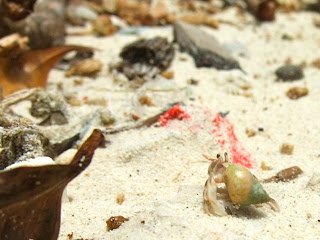We have been back from living in the village for almost a
week now, so it’s about time we update you on what we’ve been up to. Rather
than attempt to be comprehensive, we’ll try to give a few vignettes over the
coming days.
We’ll start off with something that many of you may have
heard something about already. One day, one of the young men in the village
gave me some grubs. When he gave them to me, they were still alive and
wiggling, and I was a little concerned that he expected me to eat them alive,
on the spot. Thankfully that was not the case. These were breadfruit grubs, a
bit bigger than the sago grubs you sometimes hear about. The ones I received
were in two different stages of development. This is what they look like:
I must say that this wouldn’t be my first choice for a meal
either, but I thought I should be brave and at least give some of these local
delicacies a try. So I cooked them, and ate all four (Francine and Avigail each
tried just a small bite). They don’t taste terrible; something between the
taste of potato and crayfish.
Less than 15 minutes later, I was lying on the floor with a
pounding headache, feeling lightheaded and having great difficulty breathing. Almost
the worst part was that I knew exactly what was happening, because it had
happened before, about nine years ago (after I had been stung by a bee). This
was anaphylaxis – a severe allergic reaction. In 2002, the paramedics arrived
within 10 minutes, jabbed me with an EpiPen, put me on oxygen, and brought me
to the local hospital, and I felt then like they saved my life. I knew that was
not an option here in the village. So I felt it was a very real possibility
that I would die that night. It was scary, and yet I felt calm.
I don’t remember a lot of what happened after that. I passed
in and out of consciousness a few times. The nurse from POC drove up from
Madang. People were gathering around me, trying to help. The only thing I
really remember is that people were praying. I don’t even remember that they were praying, I just had a
sense that they were. And then when I
came to, and realized I was actually going to make it, I felt like it was
really only the hand of God that saved my life. Never before had I depended on
God so fully for my very life. Never before had prayers seemed so effective.
I realized that living in Canada (or any other wealthy
country with quality healthcare), we really depend a lot on healthcare
professionals and medicine. When we’re in a health crisis, the first thing we
usually think of is to go to the hospital or take some medication. And yes, God
does give these blessings for us to make use of, but we so easily lose sight of
the reality that it is God who gives
life and takes it away, who heals or allows sickness to continue. When we see medication
alone making us better, it’s harder to see God as the one who heals.
People living in isolated villages don’t have the luxury of
good healthcare – it’s either too far away, or too expensive, or both. For many
people in rural PNG, the first thing they think of when they are sick is
prayer. They fully rely on God to heal them. They know that medication won’t
heal them (because they don’t have any), so they turn to the only one who can.
We are grateful that God spared my life. We are grateful
that he uses these opportunities also to teach us something about who he is and
how fully we are to depend on him. We trust that God used this to his glory to
show that he is more powerful. It’s quite likely, given an understanding of the
beliefs of some of the people in the village, that some people attributed what
happened to sanguma (sorcery) – but they
could clearly see that our God is more powerful than sanguma.
The next day, our host family went through the village and
told everyone not to give me anything unusual to eat. A few days later, I found
out that even some of the locals are allergic to these grubs – some get some
itchy skin, but I did also hear of one person who had a full-on anaphylaxis
like I did.
Needless to say, I will never eat grubs again.























